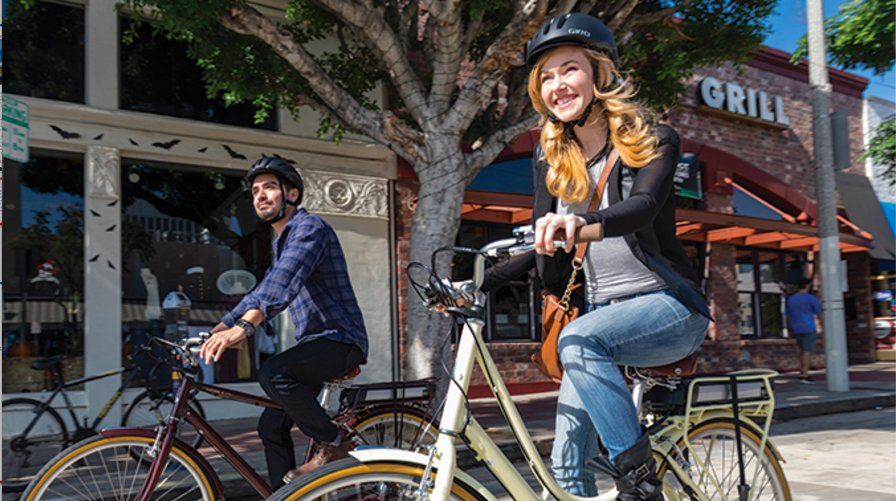The Bicycle Product Suppliers Association (BPSA) released its first-ever Annual Report and, not surprisingly, grappling with safety and legal issues around e-bikes was a major discussion point.
The report noted that on pavement, the BPSA/PeopleForBikes e-bike initiative helped bring about new laws clearing up the legality of e-bikes in Colorado, Illinois and Arkansas. Similar laws had already been passed in California, Tennessee and Utah.
“The three-class system, which is now part of several e-bike manufacturer labeling programs, has significantly reduced consumer and retailer confusion about where to ride,” BPSA writes in the report. Bills are also pending in Michigan, Ohio, and Wisconsin.
State-by-state e-bike guides suggesting e-bike routes were also published by BPSA and PeopleForBikes to assist the retailers and agencies in regular contact with riders.
Specifically for retailers, a series of 10 two-minute training videos was introduced in March 2017 called “Charged Up for E-Bikes” on the Myagi training site to inform and inspire front-line sales staff about the emerging category. Five other BPSA-member brands added the training to their brand-specific sites while Giant and Shimano both made translations into multiple languages to create global reach for the program.
The focus on electric mountain bikes (eMTBs) remains on building a user base of riders who can speak as a common voice for improved access for eMTBs and working with officials at all levels to advocate for “common sense e-bike policies” in line with the current user base and technology.
“For both of these objectives, we highlight great places to ride, and provide tools for land managers to understand and manage eMTB use,” wrote BPSA in the report. At peopleforbikes.org/eMTB, riders can find an interactive maps for eMTB-friendly trail and learn how to advocate for better access with an eMTB Playbook for Advocates guide.
BPSA wrote, “Our work with land managers has resulted in local and state parks opening up to eMTBs; the development of studies and data that help land managers better under- stand the social and physical aspects of eMTBs on trails; and positive discussions with the Forest Service, Bureau of Land Management, and National Park Service to update their policies.”
More information on the BPSA and PeopleForBikes partnership on e-bikes is available at peopleforbikes.org/e-bikes.
In other areas, BPSA noted that in July 2017, the industry learned that cassettes would now be re-classified by US Customs the same as tariff-free freewheels, with companies entitled to refunds of duties paid from past years. The change came after BPSA endured $117,500 in legal fees over the last five years to avert plans by US Customs to impose a 10 percent duty on cassettes.
Continuing an ongoing effort that dates back to 2004, BPSA recently informed its members of updates to California’s Prop 65 warning label regulations. The changes that go into effect August 30, 2018 require that companies now detail what specific chemical is contained in a product in excess of the allowable amount.
Before the Oregon bike tax was passed in July 2017, the BPSA/PeopleForBikes joint Legislative Monitoring group worked for months with The Street Trust and local bike businesses to minimize the impact and ensure that new investments in bike facilities dramatically outweigh the revenue collected. Following a concerted campaign, the tax (originally proposed at 5 percent) was rolled back to a flat $15, and the qualifying amount from $500 to $200. The projected $1.2 million in annual revenue goes into a pool of over $22 million of annual funding to build more bike facilities in Oregon.
BPSA also disclosed its first-ever annual financial report. Income reached just under $1 million for its 2016-17 fiscal year, more than double that of just three years ago due to e-bike programs, dues increases last year, and more Owners Manual revenue. Forty-six percent of its revenue comes from dues. E-bike and drive system companies made up 33 percent and 90 percent of those funds are used exclusively on programs devoted to the promotion of e-bike use.
BPSA lost members in the 2016-17 fiscal year “due to the harsh market conditions”
BPSA wrote, “From a high-water mark of 110 members, we fell to 91. Many of those companies have committed to rejoining in the current membership year, and given our progress on so many fronts, we expect to bounce back over 100.”
To receive the complete report, e-mail BPSA Executive Director Ray Keener, ray@bpsa.org.
Image courtesy BPSA
















